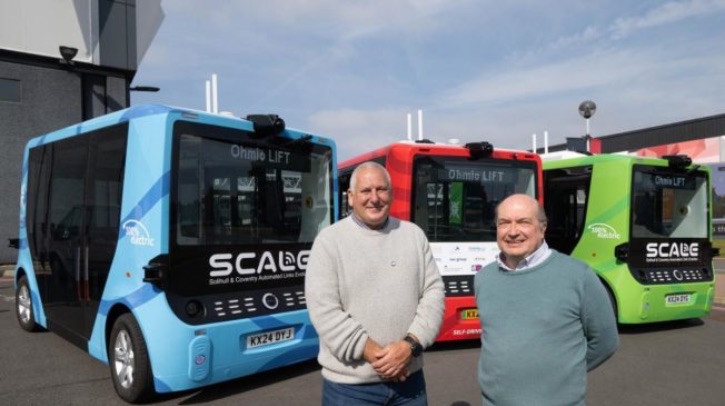The Solihull & Coventry Automated Links Evolution (SCALE) project is set to introduce three electric self-driving shuttles to transport passengers along a new 7km route linking Birmingham International rail station, the NEC and Birmingham Business Park.
Back in 2021, the town of Solihull became one of the first places in the UK to witness self-driving vehicles take to its roads as part of trials led by the council. Building on that, this new project by SCALE will demonstrate and further develop understanding around connected automated mobility (CAM) services. It will focus on the commercial viability of self-driving operations, passenger experience and operational factors such as insurance and vehicle maintenance.
The shuttles that will be used are built by New Zealand-based autonomous vehicle manufacturer Ohmio. They can carry up to 20 passengers, and they use a sophisticated suite of cameras and sensors to understand surroundings, enabling them to interact with live traffic and move around safely.
In accordance with legislation, the shuttles will have a human operator permanently on board, who will have the ability to take control if the need arises. Each journey will also be tracked from the Transport for West Midlands (TfWM) control centre on Summer Lane.
This project is being delivered by a consortium led by Solihull council, University of Warwick, Coventry University, TfWM, the NEC, Coventry city council, Direct Line Group and automated vehicle simulation specialists IPG and dRisk. Funding for the project comes from the Department for Transport’s Centre for Connected Autonomous Vehicles (CCAV).
Councilor Andy Mackiewicz, cabinet member for climate change and planning, said, “We’ve already carried out a series of successful pathfinder trials here in Solihull, and shown how it is possible to practically and safely start incorporating self-driving vehicles into key parts of our transport infrastructure. SCALE represents the next step in this learning and will help develop our understanding around how future commercial passenger services might operate.”


